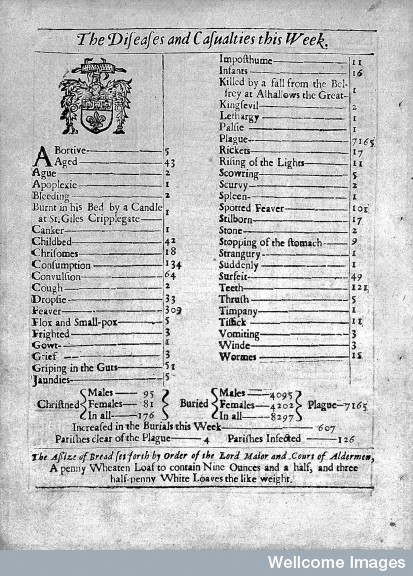London's Bill of Mortality
Annotation
During the great outbreak of bubonic plague or black death in the hot summer of 1665 in London, special bills of mortality were issued that listed causes of death. By mid-July over a thousand deaths a week were reported on handbills that were stuck up in public places to warn people that the plague was growing. The rich fled the city but the poor did not have that option and died in droves. Shown is the front of a bill that lists the final count for the year of 1665 with memento mori or remember you will die, written across the top of it and skeletons representing death around the edges. The second bill lists the number of deaths in London for just one week in September 1665. It shows that 7,165 people died from plague. Other deaths recorded point to the high infant mortality of early modern England; 17 chrisomes, or infants who died in the first month of life; 121 teeth, or infants who died when still teething. Fifteen children died from worms or parasites in the body. Several fevers are also mentioned – 42 women died from childbed fever, or bacterial infection after giving birth, and 101 people succumbed to spotted fever (probably typhus). This source is a part of the Children’s Health in Early Modern England teaching module.
Credits
Wellcome Library, "London's dreadful visitation: or, a collection of all the Bills of Mortality for this present year: beginning the 27th of December 1664 and ending the 19th of December following: as also the general or whole years bill. According to the report made to the King's most excellent Majesty / by the Company of Parish-Clerks of London," Wellcome Library, Wellcome Collection, http://images.wellcome.ac.uk/ixbin/hixclient.exe?MIROPAC=L0030700 and http://images.wellcome.ac.uk/ixbin/hixclient.exe?MIROPAC=L0030701 (accessed October 1, 2008). Annotated by Lynda Payne.

